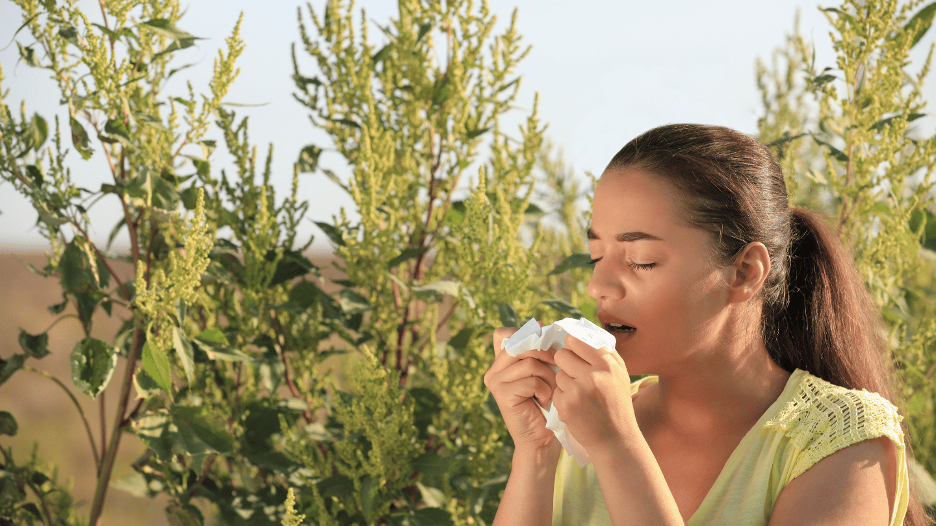
Battling ragweed pollen: conquer your seasonal allergies.
If you’ve ever experienced a runny nose, itchy eyes or sneezing fits in late summer or early fall, you might be familiar with ragweed pollen. This tiny allergen can cause big problems for those who are sensitive to it. But don’t worry—there are ways to manage a ragweed pollen allergy and keep your symptoms under control.
What is ragweed pollen?
Ragweed pollen comes from the ragweed plant, a common weed found across much of North America.
It’s especially prevalent in late summer and early fall, making it a prime culprit for seasonal allergies during these months. Each ragweed plant can produce millions of pollen grains, which can travel hundreds of miles on the wind.
Unfortunately, that means even if you don’t live near ragweed, you can still be affected by its pollen.
Symptoms of ragweed pollen allergy.
If you’re allergic to ragweed pollen, you might experience symptoms similar to other seasonal allergies.
These can include:
- Sneezing. Sneezing is one of the most common ragweed allergy symptoms, often accompanied by a runny or stuffy nose.
- Itchy eyes, nose, and throat. Ragweed pollen can irritate these areas, leading to that familiar itchy feeling.
- Watery eyes. Your eyes might water more than usual as your body tries to flush out the pollen.
- Congestion. A stuffy or blocked nose is another common sign, making it difficult to breathe through your nose.
- Sinus pressure or headaches. Congestion can lead to pressure in your sinuses, which might cause headaches.
If you notice these symptoms during ragweed season, you’re likely dealing with a ragweed pollen allergy.
What time of year is ragweed pollen highest?
Ragweed pollen is most prevalent from late summer through early fall.
Typically, the pollen season begins in mid-August and can last until the first frost, which usually happens around October in many parts of the United States.
During this time, ragweed plants release billions of pollen grains into the air, making it one of the most challenging periods for people with allergies. The pollen counts are often highest in the morning, so if you're sensitive to ragweed, staying indoors during those hours and monitoring daily pollen forecasts is a good idea.
Is ragweed allergy the same as hay fever?
Yes, ragweed allergy is often what people mean by hay fever. Here’s how they’re connected:
- Hay fever. A general term for seasonal allergies caused by pollen.
- Ragweed allergy. A specific type of hay fever that happens in late summer and early fall.
If you experience sneezing, itchy eyes, or a runny nose during this time, ragweed pollen is likely the cause. In many cases, ragweed allergy and hay fever are essentially the same thing.
Managing your ragweed pollen allergy.
While you can’t wholly avoid ragweed pollen, there are steps you can take to minimize your exposure and manage your symptoms:
- Check pollen counts. Check local pollen forecasts. On high pollen days, try to stay indoors, especially in the morning when pollen levels are at their peak.
- Keep windows closed. Keep windows and doors shut to prevent pollen from entering your home, especially on windy days. Use air conditioning if needed.
- Shower and change clothes. After spending time outdoors, shower and change into fresh clothes to remove any pollen clinging to your skin or fabric.
- Use air purifiers. To reduce pollen levels in your home, consider using an air purifier with a HEPA filter.
- Take allergy medications. Over-the-counter antihistamines, decongestants, or nasal sprays can help manage symptoms. If these aren’t effective, consult with your doctor about other options.
When should you see a doctor at CityMD for ragweed allergies?
If your symptoms are severe or not well-controlled with over-the-counter medications, it might be time to see a healthcare provider. CityMD can help you manage your allergies with personalized treatment plans, including prescription medications if necessary. We can also refer you to an allergist at our care partner Summit Health if you need additional care.
Don’t let ragweed pollen keep you down! With the right strategies and care, you can conquer your seasonal allergies and enjoy the outdoors again. Visit your nearest CityMD for expert advice and relief from your allergy symptoms.

We’re ready to care for you.
Visit any CityMD urgent care location in your community today for an evaluation with one of our expert providers.